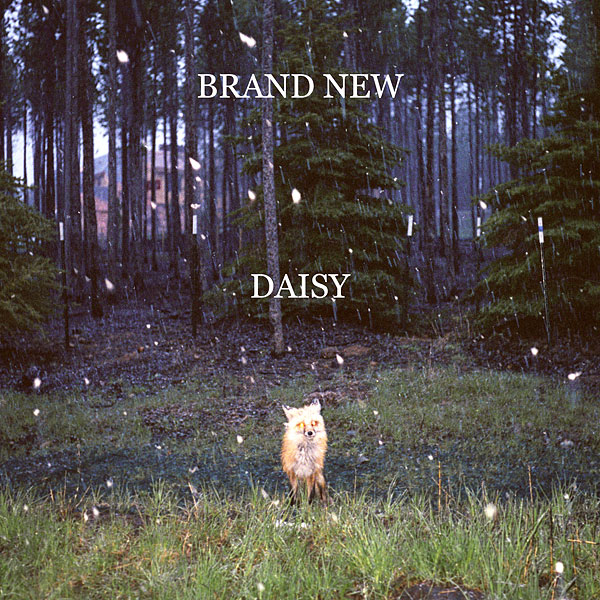The battle many bands face when recording new material is the fight between progression vs. stagnation. Artists choosing the latter category generally argue that their new material is sonically different–a new direction. Listeners find that, perhaps too often, it is almost certainly the same (See: 311, Taking Back Sunday). Other bands are perfectly happy acknowledging their lack of progression and even relish in the bombast of their musical canon’s sameness. Fortunately, fans of Brand New have never had to worry about this battle. From the time 2001’s Your Favorite Weapon was released the band has steadily progressed both musically and lyrically with each record. This progression has not been met with complete positivity from their fan base and their latest release, Daisy, is Brand New’s most polarizing release to date.
Fans drawn to Brand New for Jesse Lacey’s lyrical prowess were distraught when Lacey revealed in an interview that guitarist Vin Accardi would be penning a significant portion of the album’s words. For new listeners of the band this may not pose a problem, but Accardi’s previous foray into writing, “Handcuffs” from 2006’s The Devil and God are Raging Inside Me, was weak—there was a noticeable decline in quality between his song and the Lacey-composed tracks. Needless to say—the outlook for Daisy was bleak before a note was ever heard. Would the new songs live up to the band’s acclaimed Devil and God? To quell fears without analyzing every word, the answer is absolutely yes. Of course there are some clunkers (“The champ goes down like a clown in the second round” in “Bed”), but even these are easy to forget given the album’s overall lyrical strength.
Perhaps the most striking feature this disc offers is the mood and environment it creates from the opening moments on “Vices.” In the same way that the opening notes of Grizzly Bear’s Yellow House invite you into its warm and comforting world, so too does Daisy invite listeners into its haunted, Bible Belt church straight outta the Red Scare-infused 1950s. The album feels as if it’s inspired by close-minded stereotypes found in southern Baptist churches littered across the lower half of the country. Fittingly, the music for most of the album is primitive and dark: where past discs thrived on intricate guitars and multiple layers to create a cohesive sound, Daisy is brash and to the point.
The album starts with a recording of the church hymn “On Life’s Highway” which is fittingly dated and creepy all at once. Listeners will find themselves waiting for the recording to end and the first notes to kick in, but it doesn’t happen right away. Just when it seems as if all hope is lost (or, that the second verse of the hymn is about to start) the band unleashes perhaps its most vicious song to date in “Vices.” Lacey’s guttural pleas (“We need vices!”) are backed by harsh, seemingly random notes of guitars that eventually feed into a Jesus Lizard-inspired noise breakdown. At about the moment the cacophony kicks in it becomes abundantly clear: this isn’t the Brand New your high school girlfriend repeated ad-nauseum in the car each morning before school.
The album is neatly divided into two halves, with “Be Gone” ushering in the second half of the disc and a much needed rest after the tour de force of the first half. It’s a song that on its own wouldn’t be worth consideration as a b-side, but in context is perhaps one of the most important songs on the record. If listeners were confused at about the album’s setting, “Be Gone” provides instant clarification with swampy blues guitar and heavily delayed vocals that are more akin to the environs in True Blood than they are Little House on the Prairie.
The respite that “Be Gone” provides is short lived as the scathing “Sink” continues the audio onslaught from the first five tracks. The song effortlessly executes the quiet-loud-quiet dynamic, with a possessed Lacey interjecting when least expected. With lyrics aimed directly at those who choose to blindly accept faith, “Sink” serves as a particularly biting dose of social commentary: “He was withered and bony, exposed for a phony // But we heed the last words that he penned, ‘Haste to disgrace the traitor, do not wait ’til later’ // I don’t think that you’ve got to pretend // I see God in birds, Satan in long words.” This nearsighted methodology (and fear of verbosity) culminates on the track “In a Jar” where Lacey confronts the blindness of those claiming to see most clearly.
By the end, the album’s personalities haven’t found their God–and there is no reprieve in sight. On “Noro,” over a gorgeous melody and a broken voice, Lacey sings: “Chariots, carry us–Distances we don’t care to walk.” When it’s clear that their Godot isn’t coming, defeat is admitted when he sings “I’m on my way to hell” until the hymn from the beginning of the album picks up where it left off– the stories and personalities found throughout the album only exist between verses of an old hymn.
Having replaced their pop-punk idols of 2001 with the likes of the Jesus Lizard, Nirvana, and Modest Mouse, Brand New has once again moved their catalog of genre-defining and genre-defying albums forward. Here’s to hoping Daisy’s outro isn’t a swan song, but rather a sign of things to come.

